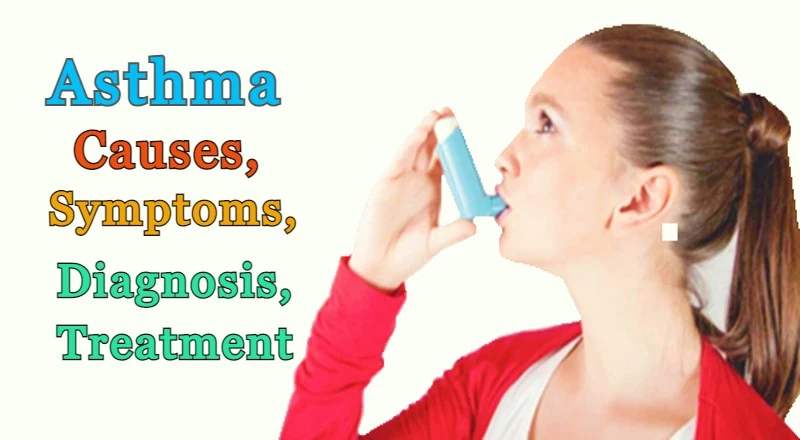Asthma is a long-term condition that affects the airways and may produce extra mucus, which causes wheezing and can make it hard to breathe. Learn more about asthma - causes, symptoms, diagnosis, and treatment.
Asthma - Causes, Symptoms, and Treatment | Dr. Yogesh Jadhav BHMS and MCAH.
Asthma is a respiratory ailment and can be life-threatening as well. Hence traditional forms of treatment are best suited for managing Asthma. However, the treatment for Asthma can be combined with alternative treatment options like Homeopathy, Ayurveda, and breathing exercises.
Homeopathy works on the fundamentals of ‘ like cures like’, and maximum potency is best achieved with highly diluted doses. Hence, we say that homeopathy can only be used in combination with traditional treatments for healing Asthma completely.
What is Asthma?
Asthma is a respiratory ailment. When under attack, a person may experience bronchial spasms, making it difficult for a person to breathe. It may result in inflamed and narrowed airways with an excess of mucous produced, hence making it difficult for a person to breathe.
While some people may have manageable symptoms, it can be life-threatening for people suffering from an aggressive form of the disease.
Symptoms and Causes of Asthma:
 |
| Asthma and Your Airways |
Asthma can affect the young or the old. Asthma usually onsets when you are young. A person under an asthma attack may complain of tightness in the chest, wheezing, and coughing. These symptoms may be mild or aggravated, and the frequency could vary from time to time.
Certain factors like cold air and allergens may flare up the symptoms. One vital aspect of managing your Asthma is making notes of things you have done, places you have been to, and food you have eaten.
Every time you have an episode of an asthma attack, going back to these notes will help you narrow down the allergens that you need to stay away from.
You would be surprised to know that sometimes the allergen could also be an everyday utility item – something like washing powder, perfumes, etc...
What happens is, if you somehow have inhaled an allergen, the body's immune system sees it as an external antibody and attacks it. So if the allergen is in your lungs, the immune system will attack the lungs.
Who is at risk of developing Asthma?
Anyone is at risk of developing Asthma based on where and how you live, your family history, your gender, and your ethnicity.
Usually, Asthma starts at a young age, but, at times, women mostly develop Asthma at a later stage. This is called the adult-onset of Asthma.
Where and how do you live?
Your environment and surroundings where you live or work can significantly impact your Asthma. It may either start the Asthma or aggravate your Asthma.
- Exposure to microbes: Exposure to microbes in the air may either develop your immunity or make you immunocompromised. If it makes you immunocompromised, your chances of suffering from asthma increase.
- Poor air quality: if the quality of air where you live or work is bad because of allergens or pollutants, you stand at risk of suffering from Asthma. Allergens could be anything like pollen, chemical fumes, dust, etc.
- Exposure to cigarette smoke in the womb: If you have been exposed to cigarette smoke while in the womb, it increases your risk for Asthma.
Family history:
If someone in your family has had Asthma, you will probably get it in heredity.
Gender:
Asthma in young is prevalent more in boys than girls, and if it's the adult-onset, it is more prevalent in women than men.
Ethnicity:
Your race or ethnicity is also a factor to consider if you have Asthma.
Diagnosis of Asthma:
Your doctor will ask you to under the following tests if they suspect you are distraught by Asthma.
Pulmonary Function tests:
 |
| Diagnosis of Asthma |
These tests include –
Spirometry is where you blow air into a tube connected to a computer. When you breathe in and out with maximum effort into the tube, the computer reads how much air passes.
Spirometry with bronchodilator test where you get tested for airflow before and after inhaling a bronchodilator.
Bronchoprovocation test where airflow is tested before and after making you inhale specific allergens.
Fractional exhaled nitric oxide test, which checks your nitric oxide levels when you breathe out. If the reading is high, it indicates Asthma.
Allergy tests run on your skin or blood. The immune system will indicate allergies.
Read Here: Tips to Improve Your Lung Health After You Quit Smoking
Treatment of Asthma:
It will take your doctor a few sessions to adjust your doses to manage your symptoms. Asthma treatment usually consists of symptom management with medication and lifestyle.
But in cases of early onset of Asthma, homeopathy gives a good chance of recovering from Asthma.
Homeopathy treatment may use the classical homeopathy approach or clinical homeopathy approach to treat patients.
The treatment plan is individualized in the classical homeopathy approach based on extensive history taking. No two individuals will be given the same dilutions. Whereas, in the clinical homeopathy approach, standard dilutions are given to patients with similar symptoms.
 |
| Treatment of Asthma |
Some constituents of homeopathic preparations include:
- Arsenic albumin
- Belladonna
- Bryonia
- Hypophysis
- Kalium Phosphoricum
- Natrium Chloratum
- Natrium Sulfuricum
- Veratrum Album
- Yerba Santa
Conclusion:
Asthma is not an ailment where you can go without unsupervised treatment. Do not make decisions without proper guidance from your doctor. Living everyday life like others is possible if you follow a well-devised plan—everyday life indicating sports and other routine activities that others follow.
Read Also: How to Protect Your Respiratory System and Keep Your Lungs Healthy

